Interview by Dan Royles on May 21, 2013, as part of the African American AIDS Activism Oral History Project.
Interview by Mark Bowman on May 5, 2021.
Duncan E. Teague, minister and HIV/AIDS educator, was born in Kansas City in the early 1960s. His father, retired Rev. Russell Lee Teague, was the long-time pastor of Westminster Missionary Baptist Church and also worked as a warehouse worker for John Deere, Inc. His mother, Alice Jean (1936-1998), was a beautician and a leader in the church in her own right. Duncan and his one younger sibling, Phillip, started school in the Kansas City public school system, which was in turmoil during that time and attempting desegregation. Starting in sixth grade he went to Lutheran schooling and then to Catholic high school where he was a student leader, and though Baptist, even led in the diocesan youth program. He drew on his musical gifts to sing in the choir--as lead vocalist--at the family church. In his teens, he found a call to gospel music ministry. He did not see any role models for Baptist ministry as an out gay man, so he walked away from his call to ordained ministry for a time.
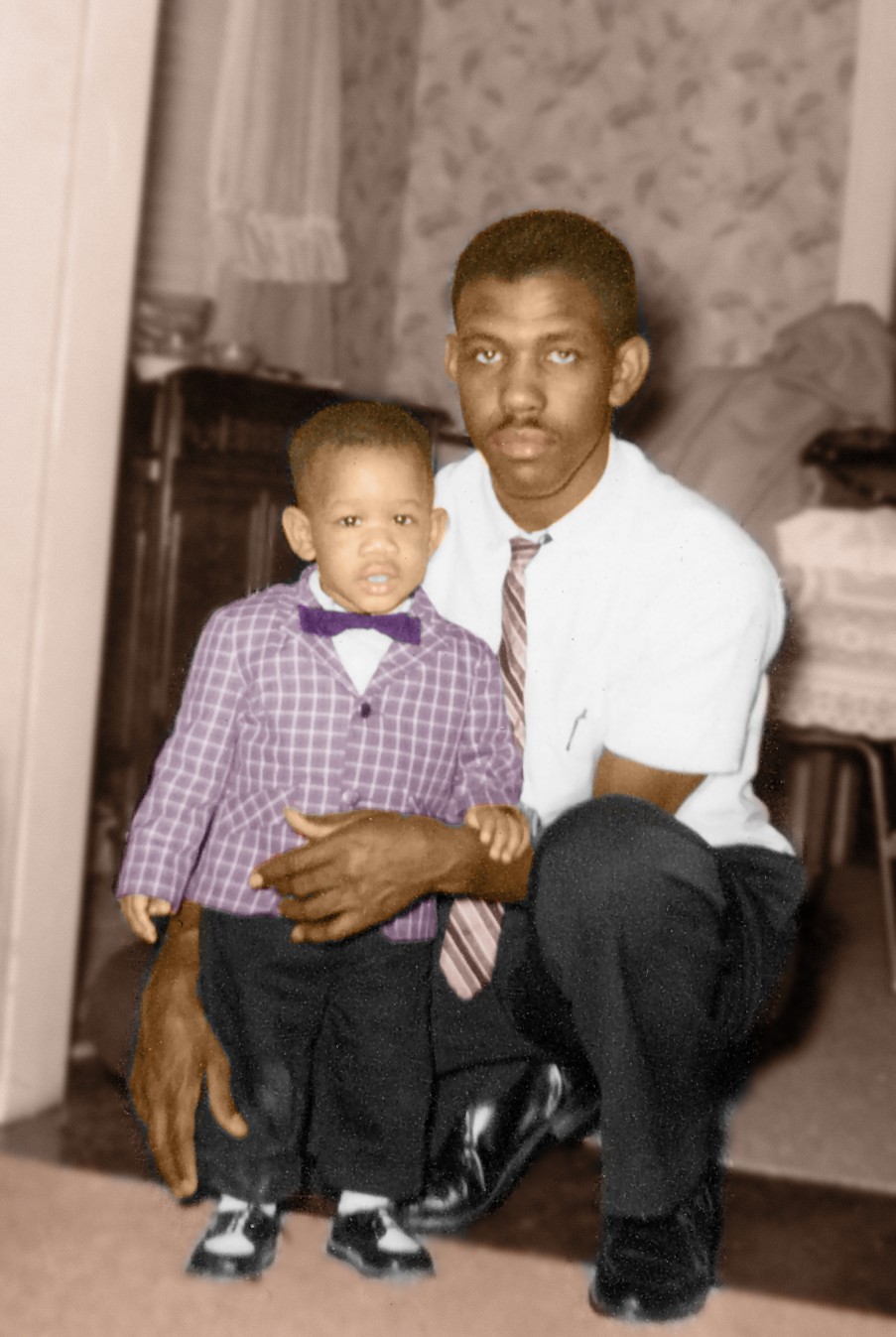 With father Russell, 1962 Duncan became aware of his attraction to men at this time and came out to two friends in high school. When he was outed by his mother a bit later, in 1981, his parents responded negatively due to their strong religious beliefs and the negative information they knew about gay culture.
With father Russell, 1962 Duncan became aware of his attraction to men at this time and came out to two friends in high school. When he was outed by his mother a bit later, in 1981, his parents responded negatively due to their strong religious beliefs and the negative information they knew about gay culture.
Desiring to attend a small private college, he started at Ottawa University in Kansas but transferred to Benedictine College in Atchison, Kansas, a conservative Catholic school. He first heard about AIDS on Phil Donahue’s talk show about that time, but there were no opportunities to learn more about it at Benedictine. He earned a B.A. degree in Theatre Arts in 1984.
Having established his gay identity, Duncan moved to Atlanta immediately after college, where he found a lively gay and lesbian culture, particularly for African Americans. He worked as a waiter, a clerk, and a Kinko’s staff person and explored making connections in the LGBTQ community. Duncan became active in the Atlanta chapter of Black and White Men Together (BWMT). He attended an AIDS volunteer training in 1985. As the incidence of AIDS in Atlanta increased, he started working for AID Atlanta as an outreach worker to the Black gay community. He regularly visited different Black community groups to do outreach and education about AIDS prevention.
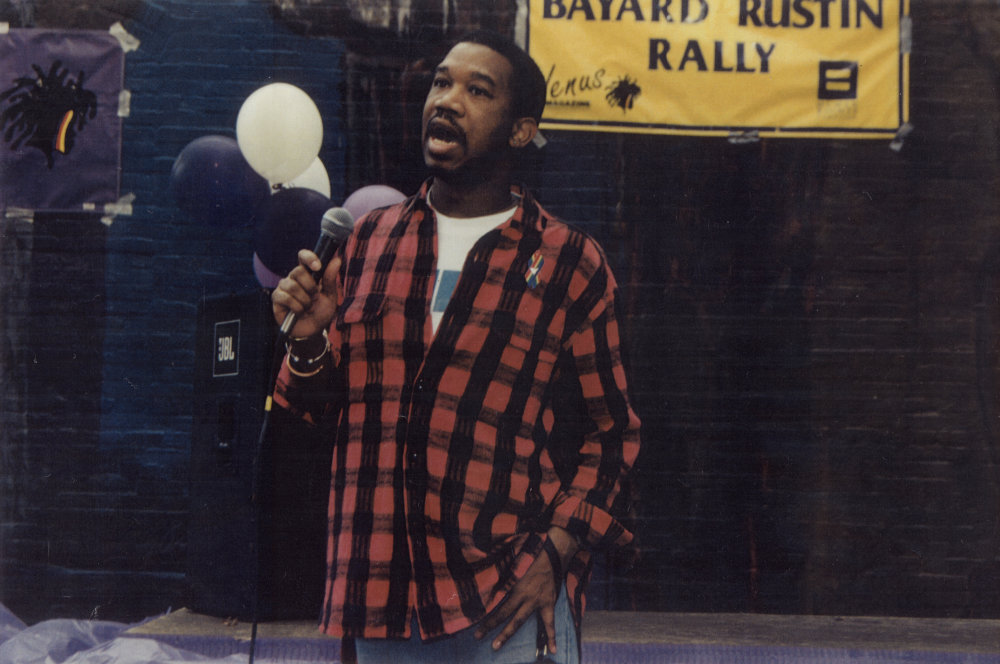 Speaker at Bayard Rustin rally Atlanta, 1990s
Speaker at Bayard Rustin rally Atlanta, 1990s
The national BWMT organization received a major grant from the Centers for Disease Control and Prevention (CDC) to do AIDS prevention education. Duncan represented the Atlanta chapter at a national AIDS conference in 1986. In 1988, Duncan started working for the National Task Force on AIDS Prevention (NTFAP). He led local Hot, Horny and Healthy workshops which provided health education, training on building self-esteem and condom negotiation through BWMT chapters across the country. The workshop was developed by Phill Wilson and attended by groups of Black gay men, usually in homes with groups of friends. He also trained other persons to be workshop facilitators. In 1991, Martin Ornelas of NTFAP opened the Atlanta office to conduct a large-scale behavioral study in southern states, Knowledge, Attitudes and Behavior. Ornelas hired Duncan and he worked on this project until 1992.
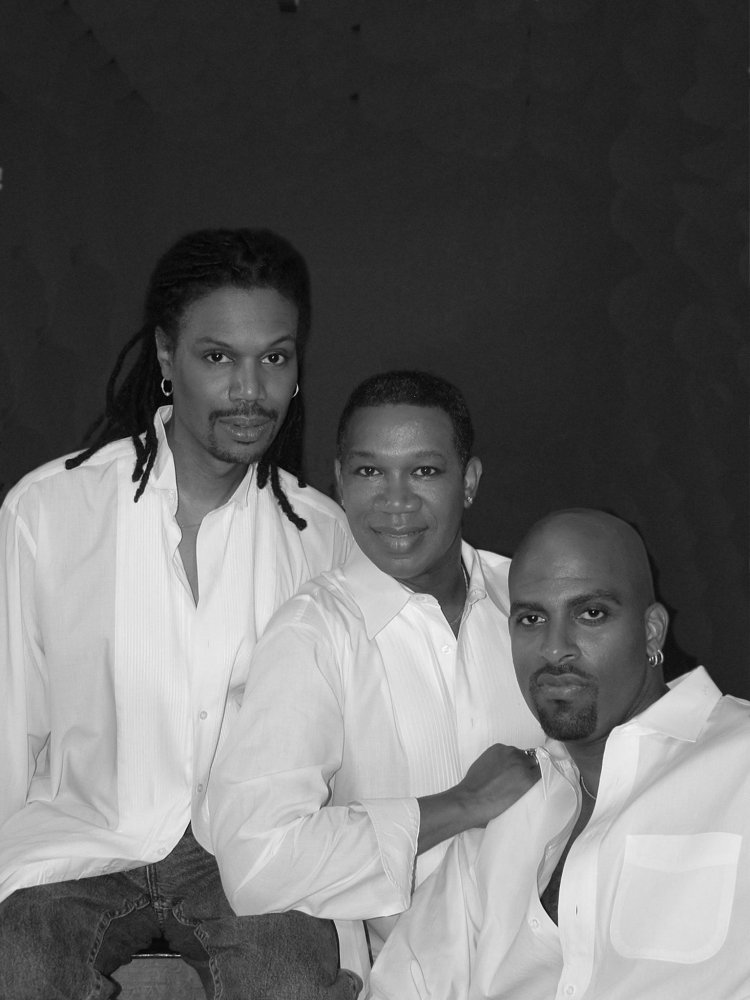 ADODI Muse--Malik, Duncan & Anthony Duncan continued working in AIDS research. He was a research assistant for the late Dr. John Peterson at Georgia State University (GSU) beginning in 1994 with his Young African-American Men’s Study and subsequent studies for nearly seven years. He worked with GSU-sponsored Caminar Latino project with the late Dr. Julia Perilla for a couple of years, followed by the AIDS Research Consortium of Atlanta with Dr. Melanie Thompson.
ADODI Muse--Malik, Duncan & Anthony Duncan continued working in AIDS research. He was a research assistant for the late Dr. John Peterson at Georgia State University (GSU) beginning in 1994 with his Young African-American Men’s Study and subsequent studies for nearly seven years. He worked with GSU-sponsored Caminar Latino project with the late Dr. Julia Perilla for a couple of years, followed by the AIDS Research Consortium of Atlanta with Dr. Melanie Thompson.
Even though not pursuing a formal ministry during this time, he did develop religious connections. He attended the local Metropolitan Community Church briefly and sang there. Around 1990 he started attending the First Existential Congregation of Atlanta, which was affiliated with to the Unitarian Universalist Association. He was impressed by their radical hospitality.
Also in the early 1990s, a friend and leader, Tony Daniels, invited Duncan to collaborate in a Black gay writing and performing group. They formed ADODI Muse: A Gay Negro Ensemble which drew on Black historical traditions and artistry to write and perform gay poetry. They became a trio with Malik Williams and performed in different settings around Atlanta and the southeast. Tony tragically died from injuries sustained in a car accident after Labor Day weekend 1998. Duncan and Malik kept ADODI going as a duo for a couple of years and then added Anthony Antoine (McWilliams) to the ensemble. Their artistry and acclaim grew, and they recorded, performed in various settings around the southeast and gay venues in the U.S. The ADODI Muse: A Gay Negro Ensemble is still writing and performing with Anthony, Duncan, and newest member, Holiday Simmons, who joined the group in 2018.
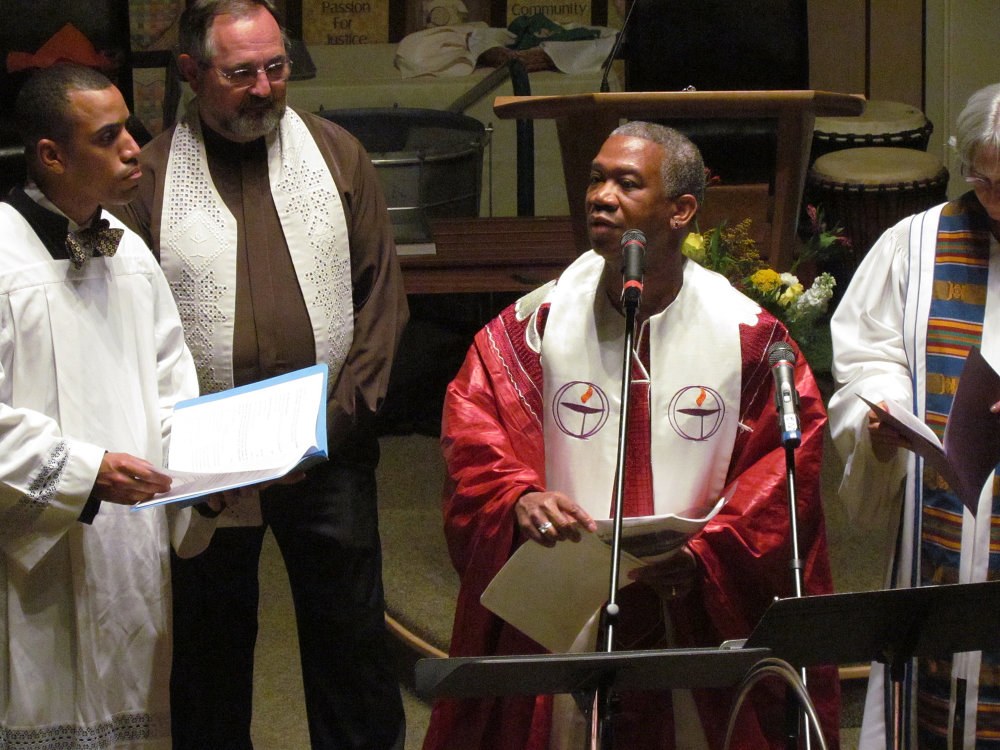 Ordination, 2014
Ordination, 2014
In 1999, Duncan was invited to join the interim ministerial staff at First Existentialist Congregation as they began the prepare for a new settled minister after the retirement of the founder, Rev. Lanier Clance. This experience rekindled and confirmed his feeling of being called to ministry. When the new pastor arrived at First Existentialist, Duncan began attending the Unitarian Universalist Church of Atlanta. There he was welcomed to various forms of ministry by the lead minister, Rev. Dr. Edward Frost, as he explored his call and path to ordained ministry.
Duncan enrolled in seminary at Candler School of Theology at Emory University, graduating in 2011. He became a ministerial candidate in the Unitarian Universalist Association, and left Atlanta for a year as the internship minister of the Tennessee Valley UU church of Knoxville, Tennessee. Duncan was ordained by the UU Congregation of Atlanta in 2014. While back at home in Atlanta, he discerned that his true calling was to plant a UU church where none has existed in the West End, a Black community.
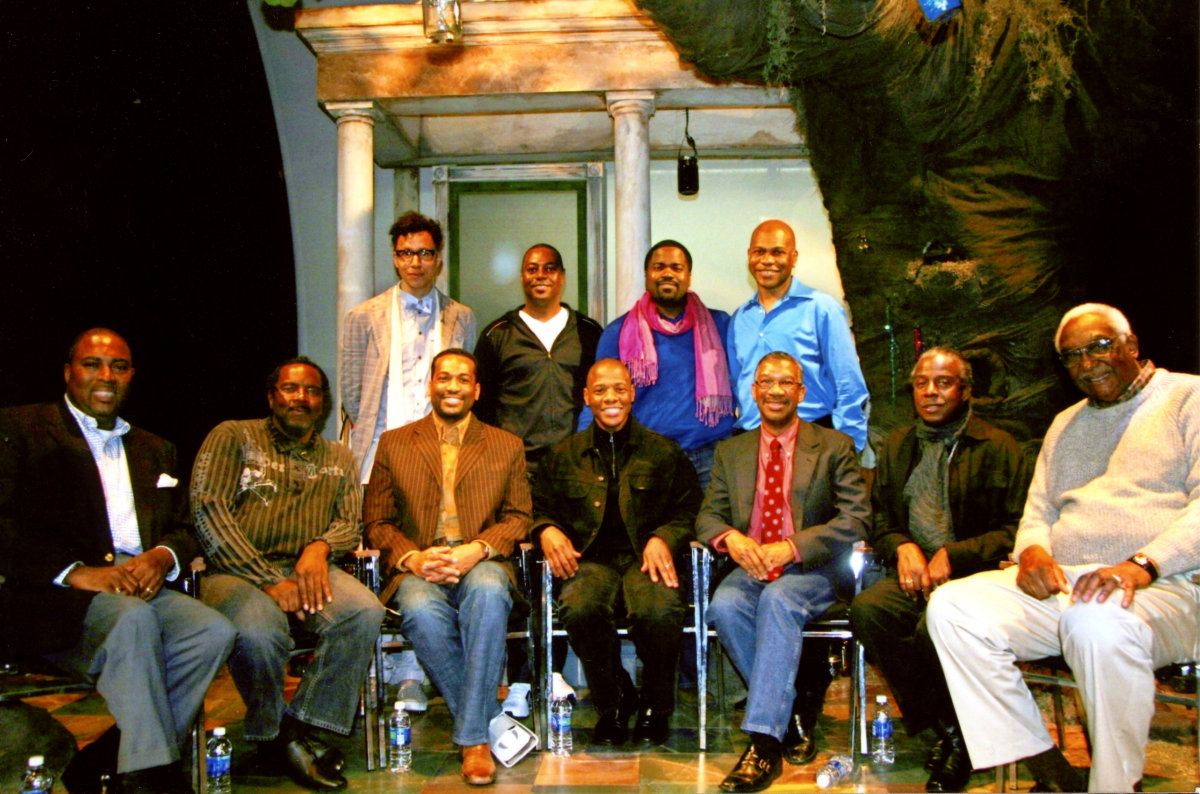 Contributors to Sweet Tea: Black Gay Men of the South
Contributors to Sweet Tea: Black Gay Men of the South
at the premiere of the stage production in Chicago starring Dr. E. Patrick Johnson.
Left to Right: George Thompson, Rosevelt Cain, Shean Atkins, Cornelius Carter, Duncan Teague, Freddie Styles, Harold
Back Row: Daniel Alexander (Director), Michael Leach, Roderick Hawkins and E. Patrick Johnson (writer, author, and actor)
In 2014, the year of his ordination Duncan was diagnosed and had surgery for prostate cancer. With the love and support of his husband, his family, and his community, he successfully completed treatment for the presence of the cancer following surgery. He is also public about this, as a message of survival to the thousands of individuals facing this disease. He is healthy and undetectable for the cancer for five years in 2021.
The now Rev. Duncan Teague worked as Georgia Equality’s Faith Outreach Consultant along with the Freedom to Marry Coalition during the 2015 Georgia legislative session. During this time, he drew together seven friends and colleagues to start Abundant Love Unitarian Universalist Congregation in the West End of Atlanta. This church planting team waited until Rev. Teague was healed from his treatment to officially begin.
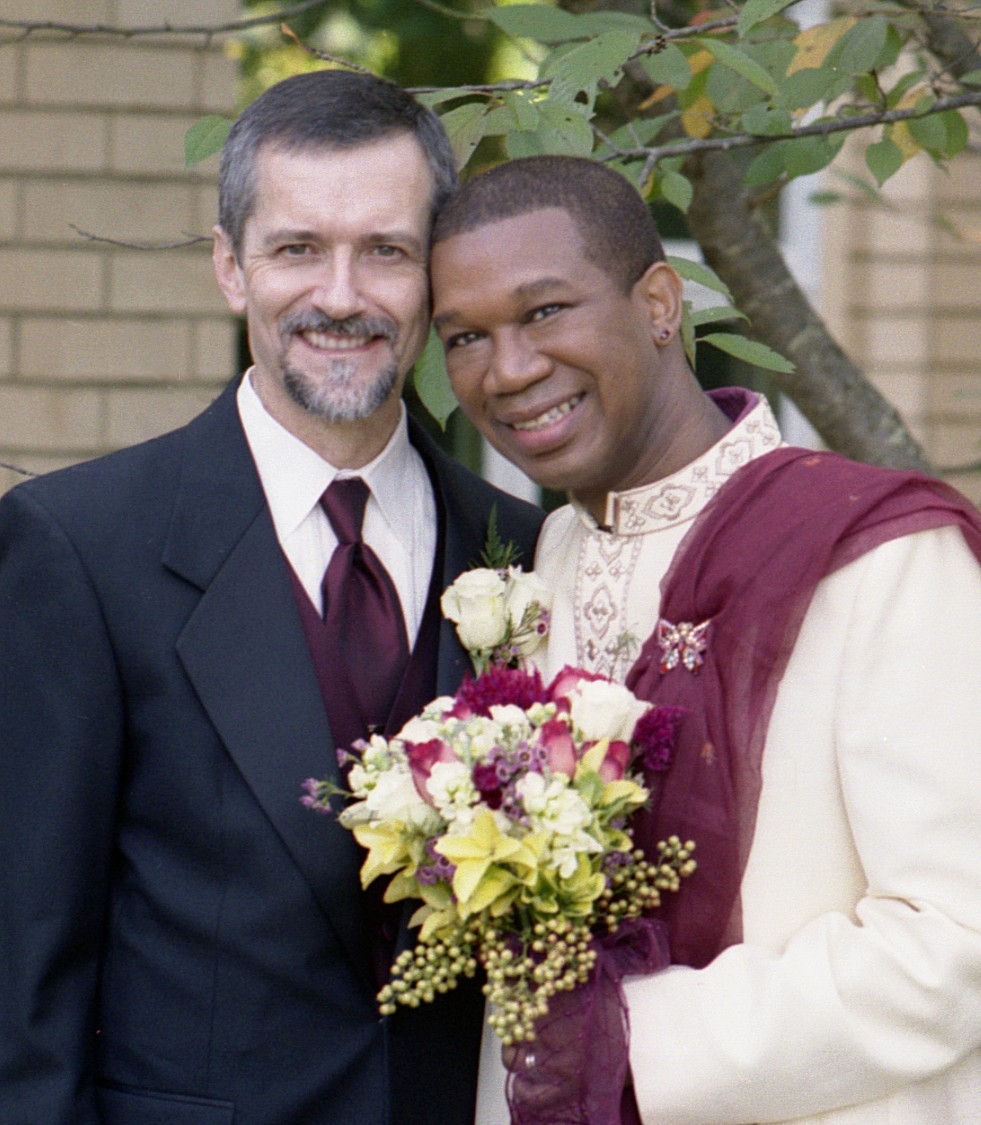 Wedding with David, 2013 In 2017, Rev. Teague was honored for his work by Georgia House Resolution 290, sponsored by Representative Park Cannon of District 58. He is thought to be the first out Black gay man to receive such honor in Georgia. Duncan has been recognized for his leadership and work by the Atlanta Pride organization, In The Life Atlanta, Inc.; official originators of Atlanta Black LGBTQ Pride, Sojourn, Georgia Equality, Atlanta Executive Network, Creating Change of National Gay and Lesbian Task Force, the Centers for Disease Control and Prevention (CDC), and many others.
Wedding with David, 2013 In 2017, Rev. Teague was honored for his work by Georgia House Resolution 290, sponsored by Representative Park Cannon of District 58. He is thought to be the first out Black gay man to receive such honor in Georgia. Duncan has been recognized for his leadership and work by the Atlanta Pride organization, In The Life Atlanta, Inc.; official originators of Atlanta Black LGBTQ Pride, Sojourn, Georgia Equality, Atlanta Executive Network, Creating Change of National Gay and Lesbian Task Force, the Centers for Disease Control and Prevention (CDC), and many others.
Duncan lives in Atlanta with his longtime companion and husband, David Thurman, now a retired physician epidemiologist, formerly with the Centers for Disease Control and Prevention and Emory School of Medicine. Duncan and David met in 1993 at the prodding of a mutual friend, Brooke Perry, who was determined to see them together. Brooke was then the co-chair with Duncan of the African American Lesbian and Gay Alliance and knew David through their mutual membership in the Atlanta Meeting of the Religious Society of Friends (Quakers). At the wedding of Duncan and David in 2003, Brooke was the Maid of Honor in Duncan’s wedding party.
(This biographical statement written by Mark Bowman from information in these interviews and edited by Teague and Thurman.)
Biography Date: November 2021
“Rev. Duncan Teague | Oral History”, LGBTQ Religious Archives Network, accessed February 14, 2026, https://lgbtqreligiousarchives.org/oral-histories/duncan-teague.